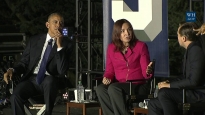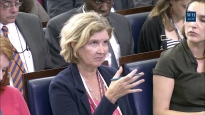President Obama Speaks to the Business Roundtable
December 05, 2012 | 17:23 | Public Domain
President Obama explains that our nation’s businesses need the certainty that middle class families won’t see their taxes go up at the end of the year, and asks business leaders for their help in supporting an approach to resolving the debt limit crisis without drama or delay.
Opening Remarks by the President to the Business Roundtable
Business Roundtable
Washington, D.C.
10:57 A.M. EST
THE PRESIDENT: Well, good morning, everybody. It is great to see all of you. Many of you I've had a chance to see individually or in small groups over the last several months, but it’s good to be back at the Business Roundtable. Jim, thanks for your leadership.
Originally, my team had prepared some remarks. They always get nervous when I'm out there on my own -- never know what I might say. Given the dialogue that we had the last time, I thought it was useful for me to abbreviate my remarks, speak off the cuff at the top, and then spend most of our time just having a conversation.
Let me begin by saying that all of you in this room are not just business leaders, not just CEOs of your companies, but you're also economic leaders and thought leaders in this country. And I recognize that all of you have an enormous investment not only in your own companies but in the well-being of America.
There are a lot of patriots in this room, people who care deeply about not only your bottom lines but also the future of this country. You’ve shown that over the last four years. We've gone through as difficult an economic period as we've seen in most of our lifetimes, and we've emerged not yet where we need to be but we've certainly made progress. And the reason we've made progress in part has been because of the outstanding management and productivity gains and efficiencies and competitiveness that you’ve been able to achieve in each and every one of your companies.
And I've said this to some of the small groups, let me repeat it to the large group -- I am passionately rooting for your success, because if the companies in this room are doing well, then small businesses and medium-sized businesses up and down the chain are doing well. If companies in this room are doing well, then folks get jobs, consumers get confidence, and we're going to be able to compete around the world.
Now, the good news is that despite the extraordinary challenges that we've seen over the last four years, there is progress in some key sectors of our economy. We've seen housing finally begin to bounce back for the first time. And that obviously has an enormous ripple effect throughout the economy. Consumer confidence is as high as it’s been. Many of you, over the last two, three years, have experienced record profits or near record profits, and have a lot of money where you're prepared to invest in plants and equipment and hire folks.
Obviously, globally, the economy is still soft. Europe is going to be in the doldrums for quite some time. Asia is not charging forward, and some of the emerging markets are not charging forward as quickly as they were maybe a few years ago.
But I think what all of you recognize and many of you have told me is that everybody is looking to America because they understand that if we’re able to put forward a long-term agenda for growth and prosperity that’s broad-based here in the United States, that confidence will not just increase here in the United States, it will increase globally, and we can get the kind of virtuous cycle that I think all of us have been waiting for and want to see.
What’s holding us back right now, ironically, is a lot of stuff that’s going on in this town. And I know that many of you have come down here to try to see is there a way that we can break through the logjam and go ahead and get things done. And I’m here to tell you that nobody wants to get this done more than me. I know that you’ve gotten a lot of briefings, but let me just try to describe where the situation is right now with respect to our fiscal situation, both what the opportunities are but what also the challenges are.
I campaigned over the last year on the idea that we need to make sure that this economy is growing and that we’re providing ladders of opportunity for folks -- (electricity goes out, feed drops) -- I can speak pretty loud. Can people hear me in the back?
During the entire campaign, I talked about the importance of short-term measures to boost growth but also a long-term plan to make sure that we've got our fiscal house in order, and I called for a balanced and responsible plan. My budget reflects a balanced, responsible plan, and I've shown myself willing to make some tough decisions when it comes to government spending -- because, despite, I think, my reputation or the reputation of Democrats, I don't think every government program works exactly the way it should. I think there are efficiencies that can be gained; there are some programs that used to work and just don't work now the way they were intended. And as a consequence, working with Democrats and Republicans last year, we were able to cut over a trillion dollars of spending -- the largest cut, by the way, in discretionary spending in history. So we're prepared to make some tough decisions when it comes to spending cuts.
But if you look at what’s needed in order for us to stabilize our budget, stabilize our deficit-to-GDP ratio, our debt-to-GDP ratio, then every credible economist will tell you that you can't just do it on spending cuts. We can't cut our way to prosperity, that there’s got to be a balanced approach in which we also are bringing in new revenues -- partly because our revenue levels are as low as they’ve been in most of our lifetimes.
And what I've proposed, what I put forward in the campaign and what I think a majority of the American people agreed with -- in fact, there’s some folks who didn’t vote for me that focus groups and polls show nevertheless they agreed with my concept when it comes to deficit reduction -- is that an approach that says we're going to raise additional revenue particularly from those who have done best in the economy over the last decade, combined with some smart cuts and with entitlement reform that can strengthen our social safety net over the long term but do so in a responsible way -- that's the way to go forward. And that's what we've put forward.
Now, the question I think on the minds of a lot of you is how do you get there -- because I know that, speaking to many of you privately, you agree with this approach. I've been struck by the number of CEOs who said, we're willing to pay slightly higher taxes if it means that we've got the kind of certainty and stability over the long term that allows us to invest and hire with confidence. So most of the folks in this room I think are onboard for a balanced plan.
The problem that we had up until fairly recently -- and this was extensively debated during the campaign -- was the belief that either, A, we could balance our budgets entirely on spending cuts, or a variation that has emerged is, is that we can do so while still lowering rates simply by closing loopholes and deductions. And you’ve heard from my team, but let me just repeat, we don't have any objection to tax reform, tax simplification, closing loopholes, closing deductions. But there is a bottom-line amount of revenue that is required in order for us to get a real, meaningful deficit reduction plan that hits the numbers that are required for us to stabilize our debt and deficits. And all the math that we've done -- and we analyzed this stuff pretty carefully -- shows that it is not possible for us to raise the amount of revenue that's required for a balanced package if all you are relying on is closing deductions and loopholes.
Let me amend that. It is possible to do, theoretically; it is not possible or wise to do as a practical matter. And the reason is, is that in order for us to raise the amount of revenue that's needed just by closing deductions and loopholes for high earners, we’d have to, for example, eliminate or severely cap the charitable deduction. And folks in this room, you guys are not only CEOs -- I can't imagine there’s a person here who doesn’t sit on a number of non-for-profit boards, university boards, hospital boards. In your respective communities, you are supporting an entire infrastructure that is the glue that holds our communities together. So the notion that somehow we're going to just eliminate charitable deductions is unlikely.
What that means is, is that any formula that says we can't increase tax rates probably only yields about $300-$400 billion, realistically. And that's well short of the amount of revenue that's needed for a balanced package.
So what we've said instead is let’s allow higher rates to go up for the top 2 percent -- that includes all of you, yes, but not in any way that’s going to affect your spending, your lifestyles, or the economy in any significant way; let’s make sure that 98 percent of Americans don't see a single dime in tax increases next year, 97 percent of small businesses don't see a single dime in tax increases next year -- and by doing that alone we raise almost a trillion dollars without any adverse effects on the economy.
Let’s combine that, then, with some additional spending cuts and some long-term entitlement reform that can get us to a number close to $4 trillion, which stabilizes our debt and our deficits relative to GDP for at least a decade, perhaps more.
That's our plan. That's what we've presented. The holdup right now is that Speaker Boehner took a position I think the day after the campaign that said we're willing to bring in revenue but we're not willing to increase rates. And I just explained to you why we don't think that works. We're not trying to -- we're not insisting on rates just out of spite or out of any kind of partisan bickering, but rather because we need to raise a certain amount of revenue.
Now, we've seen some movement over the last several days among some Republicans. I think there’s a recognition that maybe they can accept some rate increases as long as it’s combined with serious entitlement reform and additional spending cuts. And if we can get the leadership on the Republican side to take that framework, to acknowledge that reality, then the numbers actually aren't that far apart. Another way of putting this is we can probably solve this in about a week; it’s not that tough. But we need that conceptual breakthrough that says we need to do a balanced plan; that's what’s best for the economy; that's what the American people voted for; that's how we're going to get it done.
Let me make one last point and then I'll start taking questions. There had been reports -- and these are not necessarily confirmed, and maybe some of you have more insight than I do on this -- that perhaps the Republicans go ahead and let the middle-class tax cuts get extended, the upper-income tax cuts go up, otherwise we don't get a deal, and next year we come back and the thinking is Republicans will have more leverage because there will be another vote on the debt ceiling and we will try to extract more concessions with a stronger hand on the debt ceiling.
I have to just tell you that is a bad strategy for America. It is a bad strategy for our businesses. And it is not a game that I will play.
Most of you were involved in discussions and watched the catastrophe that happened in August of 2011. Everybody here is concerned about uncertainty; there’s no uncertainty like the prospect that the United States of America, the largest economy that holds the world’s reserve currency potentially defaults on its debts; that we give up the basic notion that the United States stands behind its obligations.
And we can't afford to go there again. And this isn't just my opinion; it’s the opinion of most of the folks in this room. So when I hear some on the other side suggesting that to resolve the possibility of a perpetual or a quarterly debt ceiling crisis that there is a price to pay -- well, the price is paid by the American people and your businesses and the economic environment worldwide. And we should not accept going through that.
John Engler, who is, I think -- he and I philosophically don't agree on much -- (laughter) -- no, I'm just being honest about John, and he’s a great politician but he -- he originally comes from the other party -- but John is exactly right when he says the only thing that the debt ceiling is good for as a weapon is just to destroy your credit rating.
So I want to send a very clear message to people here: We are not going to play that game next year. If Congress in any way suggests that they’re going to tie negotiations to debt ceiling votes and take us to the brink of default once again as part of a budget negotiation -- which, by the way, we had never done in our history until we did it last year -- I will not play that game. Because we've got to break that habit before it starts.
So, with that, let me just say we've got one path where we resolve this fairly quickly -- we've got some tough spending cuts, we reform our entitlements, we have modest revenue increases; you get business certainty; you do what you do best, innovate, invest, hire workers, make profits, do well by your shareholders and grow America -- and we then have open running room next year to deal with a whole host of other issues like information and tax reform and immigration reform that will further make America, Inc. competitive. That's one option.
The other option is to engage in a self-inflicted series of wounds that will potentially push us back into recession and set back this country, after all the work that we've done over the last four years digging ourselves out of a hole.
I know the choice I'd like to make. And I think the BRT can be helpful in making sure that everybody here in Washington makes the right choice.
So with that, let me take some questions. (Applause.)
END
11:14 A.M. EST
|
October 4, 2016
|
October 3, 2016
|
October 3, 2016
|
October 3, 2016
|
|
October 3, 2016
|
October 3, 2016
|
October 3, 2016
|
October 3, 2016
|
- &lsaquo previous
- …
- 17
- 18
- 19
- 20
- 21
- 22
- 23
- 24
- 25
- …
- next &rsaquo







